Fetal medicine, a specialized branch of obstetrics, focuses on the diagnosis, treatment, and management of conditions affecting a fetus during pregnancy. Traditional obstetrics primarily monitors maternal health while fetal medicine centers on the well-being of the unborn child. The latter works by reducing risks, improving treatment outcomes, and advancing the overall health of both mothers and their babies. Read to know more about the importance of fetal medicine.
Significance of Fetal Medicine
Explore the crucial aspects of fetal medicine and learn how it improves outcomes for the mother and fetus.
Early Diagnosis
One of the advantages of fetal medicine is the ability to diagnose fetal conditions early. Advancements in imaging technology, like high-resolution ultrasounds and fetal magnetic resonance imaging (MRI), allow doctors to diagnose congenital abnormalities, growth restrictions, as well as other potential complications. Early diagnosis is crucial because it opens the door to timely interventions that can improve the chances of a favorable outcome. Whether it is managing conditions, including spina bifida, congenital heart defects, or chromosomal abnormalities, early diagnosis provides families the ability to plan for necessary treatments, surgeries, or specialized care right after birth.
Management of High-Risk Pregnancies
Factors like maternal age, pre-existing medical conditions (like diabetes or hypertension), multiple pregnancies (twins, triplets, etc.), and previous pregnancy complications increase the risk for the fetus. By closely monitoring the pregnancy, fetal medicine specialists can identify potential complications, including preeclampsia, intrauterine growth restriction, or placental insufficiency. Through regular assessments and effective interventions, fetal medicine specialists can help minimize risks and optimize the health of both mother and baby throughout the pregnancy.
Improving Outcomes through Research and Technology
The field of fetal medicine in Kolkata continues to evolve, driven by ongoing research and technological innovations. Non-invasive prenatal testing (NIPT) allows for early detection of chromosomal disorders without the risk of miscarriage associated with invasive procedures like amniocentesis. Additionally, fetal surgery—though still rare—is becoming a more viable option for certain conditions, such as open spina bifida, where the fetus can undergo surgery before birth.
The Future of Fetal Medicine
As science progresses, fetal medicine will continue to redefine the possibilities for prenatal care. In the future, we may see even more advanced techniques that offer earlier, more precise diagnoses and less invasive treatments. The field’s growth is not only improving the lives of babies born with complex medical needs but also helping to shape a future where pregnancy-related complications are detected and treated more effectively.
Conclusion
Fetal medicine is a critical aspect of modern obstetrics, helping to detect and manage conditions that could otherwise threaten the health of both the mother and the fetus. Its advancements are transforming prenatal care, offering hope for healthier pregnancies and improved outcomes for families. Reach out to the best fetal medicine specialist in Kolkata for further information.

